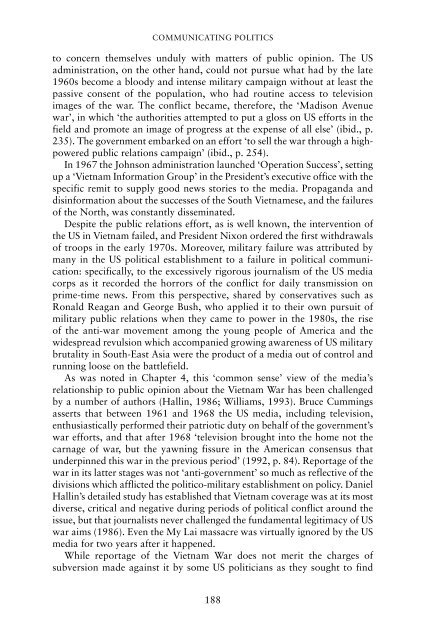20130412164339753295_book_an-introduction-to-political-communication
20130412164339753295_book_an-introduction-to-political-communication
20130412164339753295_book_an-introduction-to-political-communication
Create successful ePaper yourself
Turn your PDF publications into a flip-book with our unique Google optimized e-Paper software.
COMMUNICATING POLITICS<br />
<strong>to</strong> concern themselves unduly with matters of public opinion. The US<br />
administration, on the other h<strong>an</strong>d, could not pursue what had by the late<br />
1960s become a bloody <strong>an</strong>d intense military campaign without at least the<br />
passive consent of the population, who had routine access <strong>to</strong> television<br />
images of the war. The conflict became, therefore, the ‘Madison Avenue<br />
war’, in which ‘the authorities attempted <strong>to</strong> put a gloss on US efforts in the<br />
field <strong>an</strong>d promote <strong>an</strong> image of progress at the expense of all else’ (ibid., p.<br />
235). The government embarked on <strong>an</strong> effort ‘<strong>to</strong> sell the war through a highpowered<br />
public relations campaign’ (ibid., p. 254).<br />
In 1967 the Johnson administration launched ‘Operation Success’, setting<br />
up a ‘Vietnam Information Group’ in the President’s executive office with the<br />
specific remit <strong>to</strong> supply good news s<strong>to</strong>ries <strong>to</strong> the media. Propag<strong>an</strong>da <strong>an</strong>d<br />
disinformation about the successes of the South Vietnamese, <strong>an</strong>d the failures<br />
of the North, was const<strong>an</strong>tly disseminated.<br />
Despite the public relations effort, as is well known, the intervention of<br />
the US in Vietnam failed, <strong>an</strong>d President Nixon ordered the first withdrawals<br />
of troops in the early 1970s. Moreover, military failure was attributed by<br />
m<strong>an</strong>y in the US <strong>political</strong> establishment <strong>to</strong> a failure in <strong>political</strong> <strong>communication</strong>:<br />
specifically, <strong>to</strong> the excessively rigorous journalism of the US media<br />
corps as it recorded the horrors of the conflict for daily tr<strong>an</strong>smission on<br />
prime-time news. From this perspective, shared by conservatives such as<br />
Ronald Reag<strong>an</strong> <strong>an</strong>d George Bush, who applied it <strong>to</strong> their own pursuit of<br />
military public relations when they came <strong>to</strong> power in the 1980s, the rise<br />
of the <strong>an</strong>ti-war movement among the young people of America <strong>an</strong>d the<br />
widespread revulsion which accomp<strong>an</strong>ied growing awareness of US military<br />
brutality in South-East Asia were the product of a media out of control <strong>an</strong>d<br />
running loose on the battlefield.<br />
As was noted in Chapter 4, this ‘common sense’ view of the media’s<br />
relationship <strong>to</strong> public opinion about the Vietnam War has been challenged<br />
by a number of authors (Hallin, 1986; Williams, 1993). Bruce Cummings<br />
asserts that between 1961 <strong>an</strong>d 1968 the US media, including television,<br />
enthusiastically performed their patriotic duty on behalf of the government’s<br />
war efforts, <strong>an</strong>d that after 1968 ‘television brought in<strong>to</strong> the home not the<br />
carnage of war, but the yawning fissure in the Americ<strong>an</strong> consensus that<br />
underpinned this war in the previous period’ (1992, p. 84). Reportage of the<br />
war in its latter stages was not ‘<strong>an</strong>ti-government’ so much as reflective of the<br />
divisions which afflicted the politico-military establishment on policy. D<strong>an</strong>iel<br />
Hallin’s detailed study has established that Vietnam coverage was at its most<br />
diverse, critical <strong>an</strong>d negative during periods of <strong>political</strong> conflict around the<br />
issue, but that journalists never challenged the fundamental legitimacy of US<br />
war aims (1986). Even the My Lai massacre was virtually ignored by the US<br />
media for two years after it happened.<br />
While reportage of the Vietnam War does not merit the charges of<br />
subversion made against it by some US politici<strong>an</strong>s as they sought <strong>to</strong> find<br />
188
















